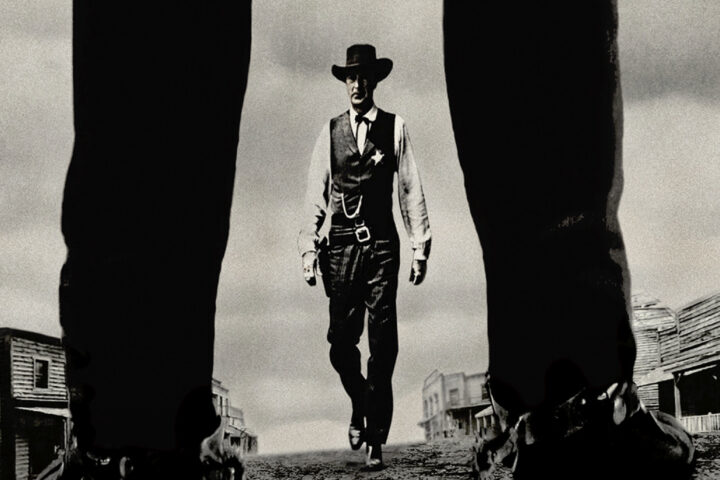Personally and professionally, Sam Peckinpah was running on fumes by the time he made 1973’s Pat Garrett and Billy the Kid. Years of substance abuse left the director in such fragile health that he spent some days on the production’s Mexico locations filming from a hospital bed, and his dilapidated condition only exacerbated his notoriously combative personality and contributed to the film’s budget and schedule overruns. Infuriated by the escalating expense of the production and set on an arbitrary runtime ceiling, MGM took over editing before Peckinpah could finish the job and released a hastily assembled 106-minute version that hit theaters to indifferent reviews and middling returns. Only in 1988, four years after the director’s death, did the film gain stature as one of his finest works thanks to the release of a rough, never-finalized preview cut prepared by Peckinpah.
An account of the final days of the outlaw Billy the Kid (Kris Kristofferson), Peckinpah’s film maudit places the man on a collision course with fate in the guise of a former compatriot-turned-sheriff, Pat Garrett (James Coburn), one of the film’s many dubiously reformed peacekeepers who used to be on the other side of the law. Garrett, too, is doomed from the outset, as the opening scene gazes into the future as he finds himself on the wrong end of a gun at the hands of his own betraying comrades. That foreknowledge hangs over Pat Garrett and Billy the Kid, generating a gloomy atmosphere that informs the drama.
The film casts an unsparing eye on the characters’ hypocritical notions of honor. Almost everyone here says that they would prefer to resolve conflicts without violence, but hardly any interaction between adversarial parties ends without it. And these aren’t vaguely ennobled duels at high noon or shootouts between chivalrous lawmen and mustache-twirling crooks but opportunistic, craven explosions that typically occur when someone’s back is turned.
Even Garrett is prone to fighting dirty, routinely picking fights with Billy’s posse, trying to goad them into making the first move so that he can justify his wanton street executions. A telling scene occurs late in the film when Billy stops in a town overseen by Alamosa Bill Kermit (Jack Elam), who nods to their shared history by letting Billy sit at his family’s table for a meal. As the two exchange cordialities, though, both prepare themselves for their reunion to end in bloodshed, and the men pointedly admit that they can see no other outcome.
This brutal assessment of the moral worth of killing squares with earlier Peckinpah features like The Wild Bunch and Straw Dogs, with the filmmaker showcasing his incredible knack for staging shootouts in a way that balances large-scale choreography with staccato bursts of close-up images of bodies recoiling from being stuck. This time, though, he adds pockets of dead space at the end of firefights that take somber stock of the impact of all this violence and the characters’ deflated resignation to death. An early scene sees Billy kill his way out of captivity, and ends when one haughty deputy (R.G. Armstrong) finds himself in Billy’s crosshairs as a townsperson cries that the Kid killed another deputy. “Yeah, he’s killed me too,” replies the lawman softly, eerily referring to himself in the past tense just before Billy pulls the trigger.
Later, Garrett finds himself in a shootout with members of the Kid’s posse at the home of Sheriff Colin Baker (Slim Pickens), who catches a mortal bullet to the stomach. In the film’s most haunting moment, Baker stumbles out to the riverbed by his home as his wife (Katy Jurado) trails after him with tears in her eyes. As Bob Dylan’s “Knockin’ on Heaven’s Door” plays on the soundtrack, the two exchange one last faint smile as the man waits to bleed out.
Pat Garrett and Billy the Kid would be Peckinpah’s final “proper” western, though Bring Me the Head of Alfredo Garcia and Convoy both found the filmmaker transposing many of the genre’s thematic and stylistic trademarks into a contemporary setting. Its quiet notes of fatalism are the fullest development of the more caustic revisionism that Peckinpah’s earlier work displayed, replacing grisly ultraviolence for its own sake with a meditative study of its aftermath.
Image/Sound
Pat Garrett and Billy the Kid’s fraught release history is reflected in the Criterion Collection’s remarkable four-disc set, which includes three separate versions of the film. A 4K disc each is dedicated to the original, studio-hacked theatrical cut and a new 50th anniversary cut carefully prepared by editor Paul Seydor and original co-editor Roger Spottiswoode. The latter version, crafted in consultation with Sam Peckinpah’s notes and Spottiswoode’s input on the director’s intent, is a major improvement over the 2003 special edition to offer the closest possible version to Peckinpah’s vision, with tighter flow and much better film elements.
A few moments in this new cut betray their status as poorly preserved footage cut from the theatrical version with a sudden loss of detail, but for the most part it and the theatrical cut look extraordinarily crisp. The earth tones of the cinematography and the dust-coated clothes and faces of the characters reveal detail never before seen in the film’s prior video releases.
The final preview cut, a slightly tweaked version of the version that resuscitated the film’s reputation and was the last cut to bear Peckinpah’s direct input, is also included, but surviving film elements were too poor to support a 4K conversion and it comes only on Blu-ray. It is, indeed, in far rougher shape than the other cuts, with many washed-out shots and faded print damage, but its inclusion is a welcome nod to the film’s turbulent post-production history.
Sound on both the theatrical and anniversary cuts is immaculate, with nary a bit of tinniness or hiss and clear distribution of dialogue, sound effects, and Bob Dylan’s rootsy score. The final preview cut has a few moments of muffling but is otherwise also strong, and comparisons to the muddier sound on Warner’s 2006 DVD reveals all-around upgrades on clarity.
Extras
The 50th anniversary version of Pat Garrett and Billy the Kid comes with a commentary moderated by critic Michael Sragow and featuring Spottiswoode and Seydor that delves into the film broadly and the new cut specifically. Sragow’s enthusiasm keeps things moving along in the face of Spottiswoode’s amusingly unromantic memories of the production and the circus of the film’s hasty initial editing. Nonetheless, Spottiswoode’s firsthand accounts, combined with Seydor’s clearly well-researched notations of what he reclaimed from the cutting-room floor, offer a comprehensive overview of the choices that went into this cut and make a strong case for it as the film’s definitive edition in the absence of a true director’s cut.
Elsewhere is a making-of documentary by Mike Siegel that brings together a host of archival materials and interviews that cover the film’s contentious production, as well as a 1988 interview with James Coburn about his memories of the shoot. A new interview with Dylan biographer Clinton Heylin covers the artist’s work on the film as both actor and composer, placing Dylan’s work on it in the context of one of his many career pivot points and the broader debt that the musician owes to cinema for shaping much of his poetic imagery. A booklet essay by author Steven Erickson argues for the film’s status as Peckinpah’s best and most personal despite, and maybe on some level because of, it being ripped out of its maker’s arms.
Overall
This stellar four-disc set of Sam Peckinpah’s great film maudit represents a profound labor of love on behalf of the Criterion Collection.
Since 2001, we've brought you uncompromising, candid takes on the world of film, music, television, video games, theater, and more. Independently owned and operated publications like Slant have been hit hard in recent years, but we’re committed to keeping our content free and accessible—meaning no paywalls or fees.
If you like what we do, please consider subscribing to our Patreon or making a donation.


